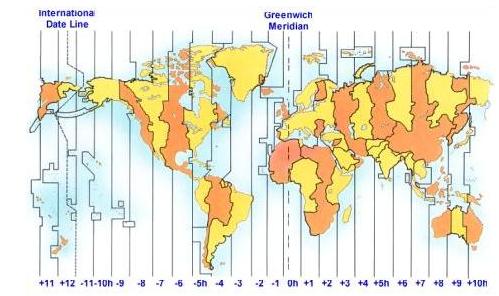As we all know, including the flat earthers, the earth rotates once every 24 hours. This gives each area on the planet a different midday. Obviously we needed to standardise on time to ensure that we were all talking from the same base which meant when you moved slightly east you didn’t adjust you clock 20 minutes. That would be accurate but hardly practical thus the earth was split into 24 time zones. As Greenwich was the base of the scientists who performed this work it was based from there with Greenwich being the meridian.
As the UK is contained within just one time zone it doesn’t matter where you are in the UK the time is the same. Speaking to someone in Europe however you find they are an hour ahead and the further East you go the further ahead they are. Going west gives us hours behind; the East coast of the US is five hours behind and the West coast 8 hours. Several countries are so big they have several time zones to worry about. US, Canada, Russia, China among others. You need to consider that when doing business with those countries.
Daylight savings
Now just to complicate matters some zones have daylight savings time. This means that twice a year the time changes. In spring it goes forward one hour. In the autumn it goes back an hour. The theory behind this is it makes people, particularly children, safer travelling to work and cuts down on the use of artificial lighting during working hours. This change takes place at 0200 and this theoretically causes minimal disruption. In our modern age though it involves millions of man hours changing clocks, video recorders, computers and lost meetings. I would envisage that in a survival situation we would simply stop doing this. What would be the point as we would be less driven by artificial time and more by the sun.
UTC, Zulu and GMT
UTC (Coordinated Universal Time) is the basis for modern civil time. Since January 1, 1972, it has been defined to follow International Atomic Time with an exact offset of an integer number of seconds, changing only when a leap second is added to keep clock time synchronized with the rotation of the Earth. Radio hams, Air Traffic Control, weather forecasts and computers generally use UTC to ensure everyone knows exactly the time that is being talked about.
GMT (Greenwich Mean Time) is an older standard, adopted starting with British railroads in 1847. Using telescopes instead of atomic clocks, GMT was calibrated to the mean solar time at the Royal Observatory, Greenwich in the UK. Universal Time is the modern term for the international telescope-based system, adopted to replace “Greenwich Mean Time” in 1928 by the International Astronomical Union. Observations at the Greenwich Observatory itself ceased in 1954, though the location is still used as the basis for the coordinate system. Because the rotational period of Earth is not perfectly constant, the duration of a second would vary if calibrated to a telescope-based standard like GMT or UT – in which a second was defined as a fraction of a day or year. The terms “GMT” and “Greenwich Mean Time” are sometimes used informally to refer to UTC.
Although there are slight timing differences between them for our use GMT, UTC and Zulu can be treated as the same time. So, in the UK GMT, UTC and Zulu are the same as UK time except when daylight savings in on where it is 1 hour ahead of GMT. We can not assume UK time, GMT, Zulu and UTC are exactly the same. Half the time they are not but we in the UK talk about GMT as if it keeps step with UK time all the time. We say GMT when we mean UK time and it does cause problems.
Most of us though don’t need to bother about time differences, time zones or daylight savings differences but if you are one of those making arrangements with others who live abroad then make sure you use UTC, it is the new standard, and don’t forget that may not be UK time so ensure it is adjusted for arrangements with UK attendees. Don’t just say 1400 GMT to your foreign attendees and forget that GMT may be an hour out for your UK attendees who will undoubtedly assume that it means 1400 UK time as on their clocks and watches.
If you remember nothing else
The key area to watch out for is if you arrange to be on at 2300Z to 2330Z, the Z is military for Zulu, and a disaster occurs during daylight savings in the UK you will start listening at 0000Z, 2300 UK time, half an hour after they have given up transmitting. That clearly is a fail. One day they may stay on an hour to see who else is out there and get you but what if power is critical. Get the timing right first time and make sure everyone understands what is being talked about. As an added confusion, they may have daylight savings time also and it may start on different dates. UTC, Zulu and GMT are standards. Use them and make sure that everyone understands the differences.
